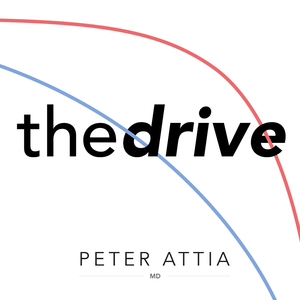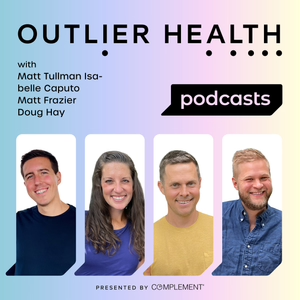
#285 - AMA #55: Exercise: longevity-focused training, goal setting, improving deficiencies, managing emotional stress, and more
01/15/24 • 21 min
4 Listeners
View the Show Notes Page for This Episode
Become a Member to Receive Exclusive Content
Sign Up to Receive Peter’s Weekly Newsletter
In this “Ask Me Anything” (AMA) episode, Peter delves into the crucial topic of exercise, starting with the importance of having a goal in training, including how and why Peter uses the goal of training for the “Centenarian Decathlon” when structuring his training plans. Peter elaborates on how to identify deficient areas within the four pillars of exercise and guides listeners on incorporating periodization training for optimal improvement and training variety. The episode explores diverse case studies, offering insights into tailored workouts for individuals of various training backgrounds, from seasoned enthusiasts to complete beginners. Additionally, Peter tackles the universal issue of emotional stress and its impact on training, as well as how exercise can help manage stress and how to determine when training should be adjusted during a high-stress period.
If you’re not a subscriber and are listening on a podcast player, you’ll only be able to hear a preview of the AMA. If you’re a subscriber, you can now listen to this full episode on your private RSS feed or our website at the AMA #55 show notes page. If you are not a subscriber, you can learn more about the subscriber benefits here.
We discuss:
- Overview of exercise topics [2:15];
- Importance of training with a goal in mind, the Centenarian Decathlon, and the natural decline of fitness with age [4:00];
- The four pillars of exercise [12:15];
- Measuring peak aerobic output with VO2max, and the importance of VO2max as a predictor of longevity [16:45];
- Measuring aerobic efficiency with zone 2 [25:45];
- Measuring and tracking muscle mass and strength [27:30];
- Case study of a fit person with a neglected pillar: why adding more training volume may not the best strategy [30:30];
- Periodization training: what it is and why it is beneficial [36:15];
- Periodization case study: high cardio fitness, lacking muscle and strength [40:00];
- Periodization case study: adequate muscle, low cardio fitness [44:45];
- Case study: significant improvement needed across all exercise pillars [48:45];
- Best ways to do zone 2 exercise and how to use relative perceived exertion (RPE) to find your zone 2 level [56:30];
- How the body responds to physical and emotional stress, its impact on training, and the consequences of chronic stress [1:01:00];
- The difference between “good” stress and “bad” or chronic stress [1:10:30];
- The complex relationship between exercise and stress, and the importance of adjusting exercise goals during high-stress periods [1:13:30];
- Clues that stress may be impacting your training [1:19:15];
- The use of wearables and devices for tracking trends and making decisions related to training [1:...
View the Show Notes Page for This Episode
Become a Member to Receive Exclusive Content
Sign Up to Receive Peter’s Weekly Newsletter
In this “Ask Me Anything” (AMA) episode, Peter delves into the crucial topic of exercise, starting with the importance of having a goal in training, including how and why Peter uses the goal of training for the “Centenarian Decathlon” when structuring his training plans. Peter elaborates on how to identify deficient areas within the four pillars of exercise and guides listeners on incorporating periodization training for optimal improvement and training variety. The episode explores diverse case studies, offering insights into tailored workouts for individuals of various training backgrounds, from seasoned enthusiasts to complete beginners. Additionally, Peter tackles the universal issue of emotional stress and its impact on training, as well as how exercise can help manage stress and how to determine when training should be adjusted during a high-stress period.
If you’re not a subscriber and are listening on a podcast player, you’ll only be able to hear a preview of the AMA. If you’re a subscriber, you can now listen to this full episode on your private RSS feed or our website at the AMA #55 show notes page. If you are not a subscriber, you can learn more about the subscriber benefits here.
We discuss:
- Overview of exercise topics [2:15];
- Importance of training with a goal in mind, the Centenarian Decathlon, and the natural decline of fitness with age [4:00];
- The four pillars of exercise [12:15];
- Measuring peak aerobic output with VO2max, and the importance of VO2max as a predictor of longevity [16:45];
- Measuring aerobic efficiency with zone 2 [25:45];
- Measuring and tracking muscle mass and strength [27:30];
- Case study of a fit person with a neglected pillar: why adding more training volume may not the best strategy [30:30];
- Periodization training: what it is and why it is beneficial [36:15];
- Periodization case study: high cardio fitness, lacking muscle and strength [40:00];
- Periodization case study: adequate muscle, low cardio fitness [44:45];
- Case study: significant improvement needed across all exercise pillars [48:45];
- Best ways to do zone 2 exercise and how to use relative perceived exertion (RPE) to find your zone 2 level [56:30];
- How the body responds to physical and emotional stress, its impact on training, and the consequences of chronic stress [1:01:00];
- The difference between “good” stress and “bad” or chronic stress [1:10:30];
- The complex relationship between exercise and stress, and the importance of adjusting exercise goals during high-stress periods [1:13:30];
- Clues that stress may be impacting your training [1:19:15];
- The use of wearables and devices for tracking trends and making decisions related to training [1:...
Previous Episode

#284 ‒ Overcoming addictive behaviors, elevating wellbeing, thriving in an era of excess, and the scarcity loop | Michael Easter, M.A.
View the Show Notes Page for This Episode
Become a Member to Receive Exclusive Content
Sign Up to Receive Peter’s Weekly Newsletter
Bestselling author Michael Easter returns to The Drive to discuss his new book, Scarcity Brain. In this episode, Michael explores the evolutionary backdrop that molded human beings, a setting characterized by scarce food, limited information, and few possessions. He contrasts that with the modern era, marked by abundance and comfort, and the ensuing repercussions on our physical and mental well-being. Michael introduces the concept of the “scarcity loop,” a three-part behavior cycle which helps explain modern challenges such as overeating, addiction, gambling, and materialism, and offers practical strategies to break free from its cycle. The episode culminates in a thought-provoking exploration of happiness, drawing on Michael's experiences with monks and underscoring the value of boredom, exploration, and discomfort as transformative elements that elevate awareness, presence, and the will to live.
We discuss:
- Inspiration for Michael’s latest book, Scarcity Brain [2:15];
- Evolutionary adaptations to the scarcity of food contrasted with the modern obesity crisis [4:00];
- Lessons learned about diet and nutrition from living with hunter-gatherers [9:30];
- The impact of ultra-processed foods on energy balance [20:30];
- Michael’s experience with attempting the hunter-gatherer diet at home [27:30];
- The roots of excess: factors that contribute to overeating and the varied vulnerabilities among individuals [34:00];
- The scarcity loop: how components of the scarcity loop are illustrated in gambling and addiction [39:45];
- Using knowledge of the scarcity loop to break the cycle [50:45];
- The evolutionary drive to acquire material possessions [58:15];
- The benefits of boredom and value of exploration [1:07:00];
- The consequences of an attention economy driven by negativity bias [1:16:30];
- Navigating the world of endless information and the value in “slow information” [1:23:00];
- Defining happiness, and the downward trend in reports of happiness [1:33:00];
- Purpose, austerity, self-reliance and other missing elements of happiness gleaned from the study of monks [1:38:30];
- The value in uncomfortable activities that increase your awareness, presence, and will to live [1:48:45]; and
- More.
Connect With Peter on Twitter, Instagram, Facebook and YouTube
Next Episode

#286 ‒ Journal club with Andrew Huberman: the impact of light exposure on mental health and an immunotherapy breakthrough for cancer treatment
View the Show Notes Page for This Episode
Become a Member to Receive Exclusive Content
Sign Up to Receive Peter’s Weekly Newsletter
Andrew Huberman, professor of neurobiology at Stanford University and host of the Huberman Lab podcast, returns for another special journal club episode. Andrew introduces an observational study investigating the influence of light exposure on circadian clock regulation and its link to mental health, while Peter covers a phase III clinical trial employing immune checkpoint inhibitors for the treatment of metastatic cancer. They delve into the essential findings of their respective papers, elucidate the reasons for their enthusiasm, and tackle potential limitations and unanswered questions. Additionally, they provide valuable insights into their approaches for comprehending research studies, aiding listeners in independently navigating this process.
We discuss:
- The intricate relationship between light exposure, circadian rhythms, and mental health [3:30];
- The importance of low solar angle sunlight, and other types of light needed for optimal mental and physical health [12:00];
- Promising new lightbulb technology that simulates low solar angle sunlight [17:45];
- The significance of both darkness and the need for direct light exposure to the eyes, specifically [20:00];
- Some tips and advice regarding optimizing light exposure, blue blockers, and effects on circadian rhythm [22:15];
- Andrew presents a paper which suggests avoiding light at night and seeking light during the day is associated with better mental health [25:45];
- Examining the data: the negative impact of increasing nighttime light exposure and the positive effects of daytime light exposure [34:30];
- Statistical analysis: the importance of focusing not only on statistical significance but also clinical relevance, power analysis, error bar range, and more [45:45];
- Takeaways from the study of daytime and nighttime light exposure [49:45];
- The practicalities of minimizing light exposure and screen time at night, the use of sleep trackers, and overall challenge of modern, indoor lifestyles [55:15];
- Potential limitations of the light exposure study, reverse causality, and the complex interplay of variables in epidemiological studies [1:06:00];
- A tangent on diet soda and sugar substitutes as an example of reverse causality [1:13:15];
- Andrew and Peter’s take on the causality vs. correlation of light exposure to mental health, the damage of circadian disruption, and the interpretation of observational data [1:17:30];
- A primer on the immune system as background for the paper Peter chose [1:25:00];
- Background on cancer: causes, how it evades the immune system, and the logic behind immune checkpoint inhibitor therapy [1:35:45];
- Peter presents a paper on immune checkpoint inhibitor therapy in cancer patients [1:50:15];
- Unpacking the results of the checkpoint inhibitor trial [1:59:45];
- Other noteworthy observations, including the differing results between males and females [2:15:30];
- Adverse effects resulting from treatment with an immune checkpoint inhibitor targeting CTLA-4 [2:20:00];
- Why melanoma is especially responsive to immunotherapy, and the remarkable success story of immunotherapy for pancreatic cancer [2:25:15];
- Why immunotherapy may be the most important hope we have for treating cancer [2:35:30];
- Avoiding melanoma: the sunscreen debate, sunburn as the biggest risk factor, and more [2:38:45]; and
- More.
Connect With Peter on Twitter, Instagram, Facebook and YouTube
If you like this episode you’ll love
Episode Comments
Featured in these lists
Generate a badge
Get a badge for your website that links back to this episode
<a href="https://goodpods.com/podcasts/the-peter-attia-drive-22593/285-ama-55-exercise-longevity-focused-training-goal-setting-improving-42026514"> <img src="https://storage.googleapis.com/goodpods-images-bucket/badges/generic-badge-1.svg" alt="listen to #285 - ama #55: exercise: longevity-focused training, goal setting, improving deficiencies, managing emotional stress, and more on goodpods" style="width: 225px" /> </a>
Copy




